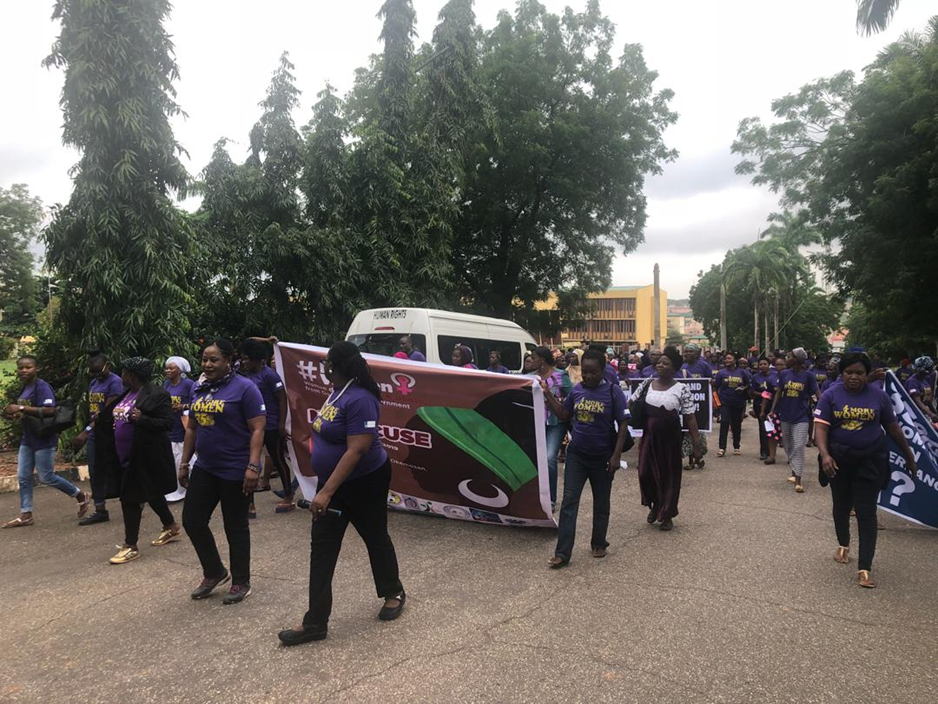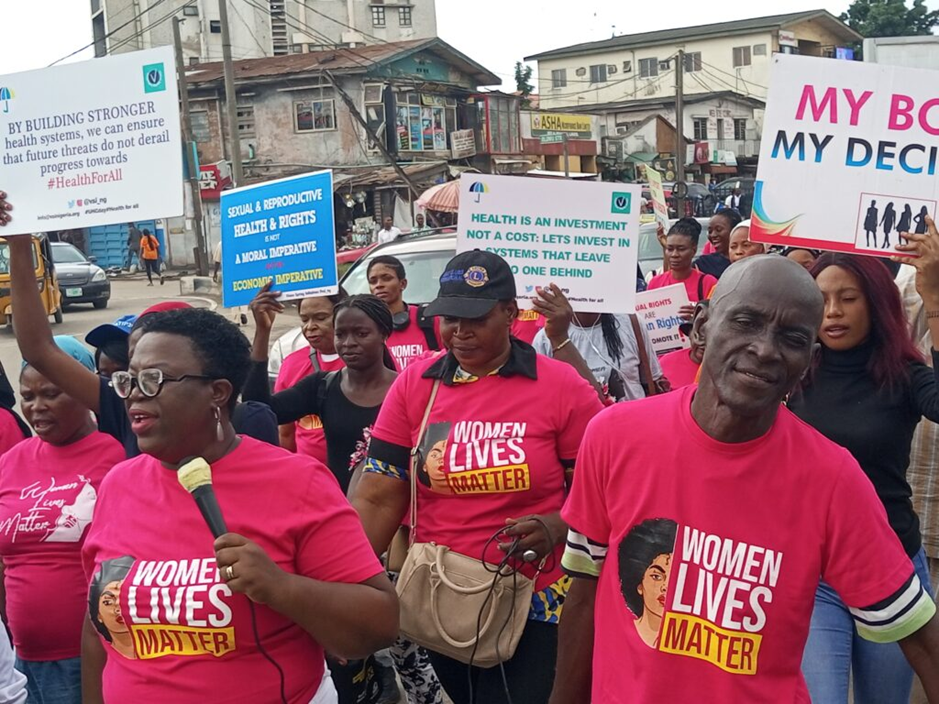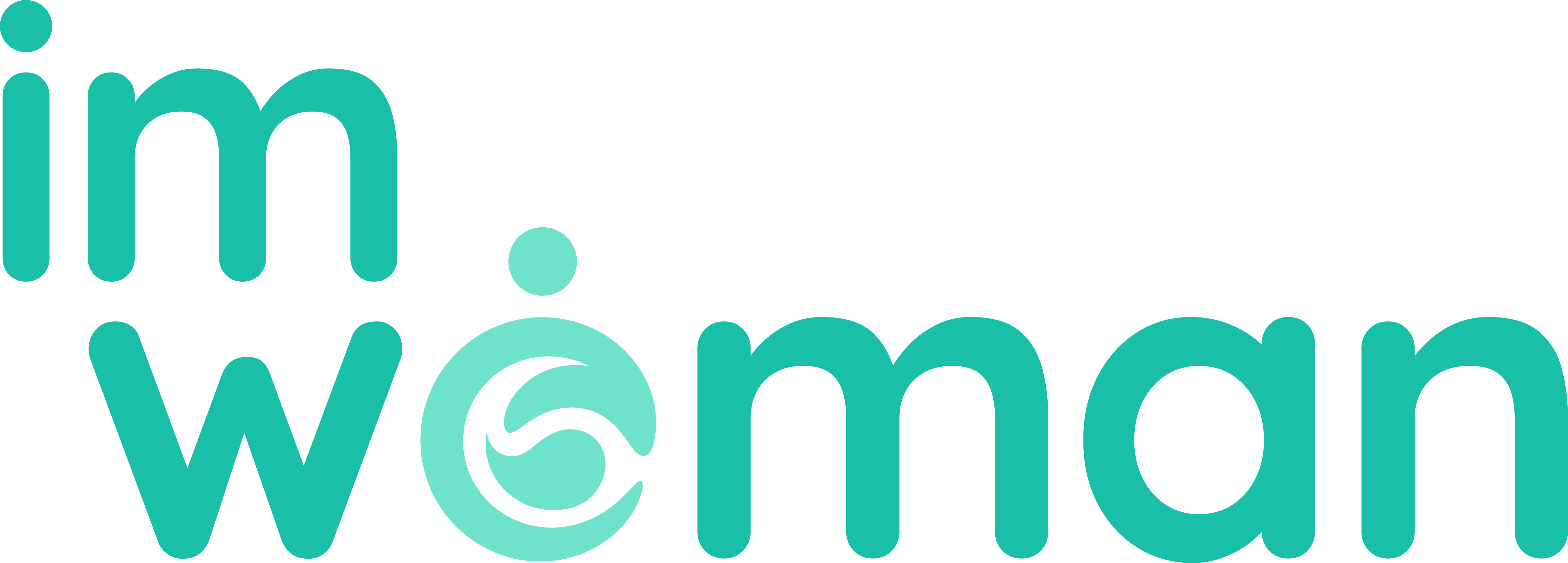Challenging discrimination in maternal healthcare: interview with Dr Abiola Akiyode-Afolabi
In 2002, Nigerian lawyer and civil rights activist, Dr Abiola Akiyode-Afolabi, founded the Women Advocates Research and Documentation Center (WARDC), with two female lawyers in Nigeria seeking justice to prevent maternal deaths. WARDC primarily provides pro bono legal services to women who have experienced violence.
The organisation has partnered with the I’M WOMAN Trial team on the TRANSFORM project to engage communities in Nigeria to ensure more women receive treatment for life-threatening bleeding after childbirth. Tranexamic acid (TXA) was recommended by the World Health Organization to treat postpartum haemorrhage (PPH) in 2017, yet many women and healthcare workers are unaware of its benefits. Raising awareness about a life-saving drug like TXA in Nigeria could ensure more women receive treatment if they experience severe bleeding after childbirth.
This International Women’s Day, we celebrate Dr Abiola and WARDC’s achievements and learn more about her plans with the TRANSFORM project.
How did WARDC begin?
It all started in the year 2000 when Safiya Husaini was sentenced to death because she became pregnant out of wedlock. It was seen as adulterous. The law didn’t have any conviction or sanction for the person who impregnated her. Because she is pregnant, she must be punished. We started the Safiya Must Not Die campaign after 2000. The ruling was later overturned.
When I started to look into women’s sexual and reproductive rights, I found that there were lots of issues in the [Nigerian] constitution, so we needed to come together in solidarity to support women. At that time, the maternal mortality rate of Nigeria was also very high, so it was obvious that Nigerian women were suffering. Whether due to religion or traditions*, there were no laws to support women’s identities in Nigeria.
We started off as four women lawyers and a journalist. I named WARDC after the female ward “Ward C” at Lagos University Teaching Hospital (LUTH) where I gave birth. But, WARDC is also an acronym influenced by our original name “women advocates”. Since there was no data, we wanted to research and document violence against women in Nigeria.
*Safiya’s planned execution was ordered under the Islamic ‘Sharia’ law of Sokoto state in Northern Nigeria. She told reporters in Nigeria that her pregnancy was a result of rape. She was the first woman to be sentenced to death by stoning in Sokoto state.

Credit: WARDC (2019). A coalition of 150 women organisations from the More Women Campaign called on the Ogun State Governor, Prince Dapo Abiodun, to ensure a 35 percent representation of women in his cabinet.
How did WARDC begin to address the issue of mothers dying in childbirth in Nigeria?
After Safiya’s successful campaign, we began our Not Again campaign to stand up for women dying from childbirth and demand the provision of quality maternal health services. This became a long-term campaign for years, aimed at creating and increasing public awareness on maternal health issues as a human right.
What kind of challenges did you experience when approaching maternal healthcare in Nigeria?
We started working with communities identifying women and pregnant women, but many hospitals were not reliable enough to deal with their pregnancies. Some issues remain today since maternal mortality has not reduced in Nigeria.
In a bid to get more pregnant women to the hospitals, we identified corruption as one factor that might deter women. Many pregnant women preferred to be cared for by traditional birth attendants than pay for pregnancy kits and other payments demanded of them by underpaid hospital workers.
Lack of infrastructure also meant women were unable to access immediate support for their medical needs. Some traditions and cultural barriers prevented some women from even going to a hospital.
Using a human rights-based approach, we worked with women to make them feel empowered and demand their right to live. I went to court to explore administrative and legal options to make that demand possible.
I sued the secondary health care centre in Lagos and acted against some private hospitals who detained women for not paying medical bills, especially after medical emergencies.
The challenge is that, yes, women are dying. Some are dying because of postpartum haemorrhage or other preventable reasons. Both governments and citizens have the power to stop these preventable deaths. I know first-hand how the health system could contribute to maternal deaths having experienced a maternal health care centre giving birth in Nigeria.
What kind of issues do women in Nigeria face when giving birth?
In Nigeria, a woman is expected to have at least two pints of blood in reserve before she’s accepted by the hospital [to treat PPH]. Blood donations are needed in case women need blood when giving birth.
We realised that because they [families] will be tested for hepatitis B and HIV, some men are very reluctant to go and donate blood. The patriarchal culture loads the burden of childbirth on women, with expectations that they are strong enough to give birth with minimal help. Many men shy away from getting their blood screened because there is still stigma associated with blood donation and screening. If a woman raises this with her husband before delivery, she risks violence or stigma.
Hospitals will refuse to take you if they don’t have the conditional precedent [blood].
So, we went to court to say that blood donations should be voluntarily given as a backup in case the woman needs those two pints of blood.
That’s where the TRANSFORM project comes in – tranexamic acid can help to address postpartum haemorrhage. Data shows that a high number of women die due to PPH. So, if we bring in Nigeria as a focus country it becomes very important to take that step and address the many preventable deaths that we have.*
*Evidence shows that TXA can significantly reduce the need for blood transfusions. Therefore, widening access to TXA could help hospitals cuts costs in procuring blood and save families from needing to donate blood.
The WHO’s SDG.3.1 commitment aims to reduce global maternal deaths by 2030. What more can be done in Nigeria to improve global maternal health?
From our findings, there were some improvements during the UN’s Millennium Development Goal (MDG-5, 2015). The government upscaled the healthcare sector between 2011 and 2015 at the same time when our advocacy increased. We’re going from clinic to clinic demanding accountability – our book in 2007 demanded human rights accountability in Nigeria.
In 2011, the Nigerian government introduced the MamaYe programme which means “mothers survive” in Nigerian, with funding to improve healthcare infrastructure. Kadina state, for example, addressed accessibility to maternal health services which was a major issue for people in rural areas where there is a huge population of women, and needing to travel long distances to medical facilities.
States provided tricycles to take pregnant women when they were at the point of delivery. So, some of them in the north and hard-to-reach places didn’t even get to the hospital. They either gave birth on the road, died on the road or bled to death.
Unfortunately, after 2015, the government no longer treated maternal mortality reduction as important. Nigeria’s maternal death rate increased by about 14% in 2020, compared to 2017. Our data indicators on SDG 3.1 are not really improving in this regard. Nigeria’s health budget has always fallen short of the globally acceptable standard. It was 4.47% in 2024, compared to the acceptable 15%. Besides the budget, a large chunk of government money is not released to the health ministry yet alone spent on women’s healthcare.
Maternal deaths are also seen as something that’s related to poverty; the high cost of clinics, hospital access, access to a vehicle, all affect women who are poorer. So that’s why the community plays a role to say this is a reality and we don’t want to continue to die. The government needs step up and do all that is necessary.
How can you improve this in your community and what challenges might you experience?
For our work with TRANSFORM, first women need to know there is something that can save their lives. It’s important to raise awareness about postpartum haemorrhage with women, so they can get help if they ever experience it. PPH has contributed so much to maternal deaths.
Second, we must engage with the government to use TXA as part of the interventions that can be made to address postpartum haemorrhage.
However, this would happen in the longer term as there might be pushback over where TXA comes from. People may see it as a western idea. Take the polio vaccine as an example. Despite its benefits, the polio vaccine was initially resisted in some northern states in the country. It took the UNFPA and other global organisations a long time to intervene. There could also be political challenges. If the federal Ministry of Health in charge of approving any medication used in this country denies TXA, it will be difficult.
We can learn some of these lessons when raising awareness of TXA. That is why we are looking at Lagos, which is a more liberal place where the interventions can take place. And Lagos has a high population – we can address over 35 million people in the state.
How will you work in your community with TRANSFORM to expand access to TXA and ensure more women reach a hospital and receive treatment for postpartum haemorrhage?
Part of the project is focused on identifying gatekeepers, engaging with those gatekeepers then with the women in the communities to increase demand for PPH interventions.
We intend to break down the barriers that could affect women’s access to treatment like TXA. What we then need is to build voices. I’ll raise awareness with young women who are getting married or may be pregnant and having conversations in community spaces like churches.
Radio is one medium through which we can raise awareness across Nigeria, as it reaches many people.
We have a national campaign called Women’s Lives Matter that supports the need for the government to do more to address unsafe abortion. There is a link between this whereby after an unsafe abortion a woman can bleed to death. So, TRANSFORM could also address access in the community this way.
We are putting the women and the community first in the conversation and engaging female mobilisers to speak with other women in their communities. Then we can talk with religious leaders because they are influential gatekeepers in those communities.

Credit: WARDC (2022). Dr Abiola Akiyode-Afolabi led a protest against the suspension of the Lagos State guideline on the safe termination of pregnancy.
Lastly, what empowers you to advocate for women facing violence?
I want to be in a world where everybody enjoys their rights and privileges without any form of discrimination. I see maternal mortality from a broader perspective of discrimination. I believe in protecting a woman’s dignity when someone is left to die.
We need to do more to ensure that we stay focused and demand that women’s lives matter. And the time is now.
The TRANSFORM project is funded by Unitaid and focuses on expanding equitable access to TXA for women at risk of severe bleeding after childbirth.
WARDC is part of the TRANSFORM project’s community advisory board. Dr Abiola Akiyode-Afolabi will lead on engaging communities in Nigeria to raise awareness of tranexamic acid (TXA) and postpartum haemorrhage (PPH), so more women receive treatment for life-threatening bleeding after childbirth.
WARDC will support the delivery through impactful community and media campaigns, involving 12 field advocates, consultants, a social media expert and a radio programme coordinator.

